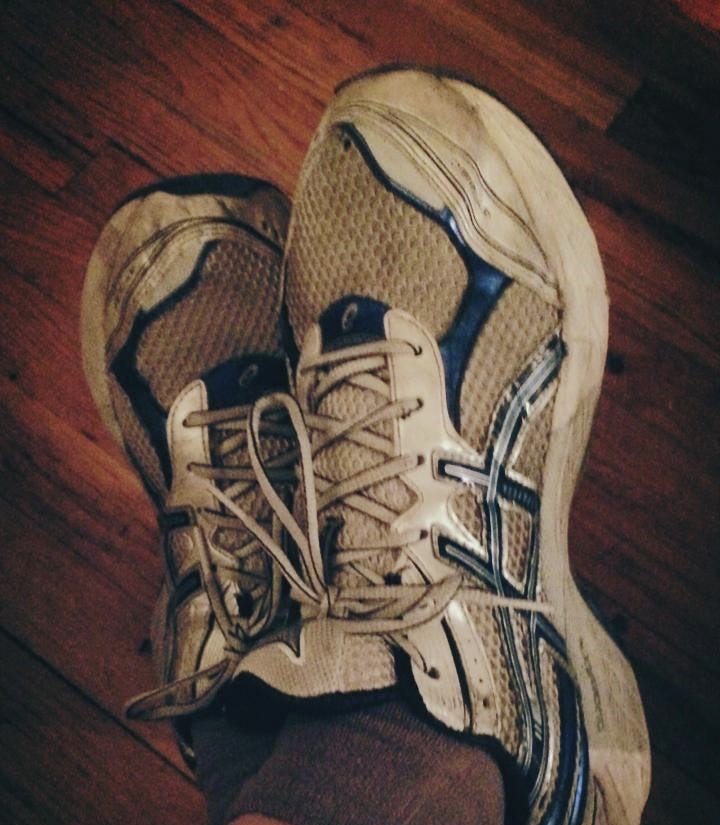I don't need to be the best.
On running, optimizing daily performance, and completely missing the point.
I went for a run the other day, and it was hard. Slow, thudding, painful. I was happy just to finish my route without needing a walk break, a small victory against two years of parenthood-abetted sloth. I’ve run a fair amount in the past, completing a handful of marathons and other events in between extended dead periods like this. At times, I’ve had big dreams of getting faster, stronger, better, of completing longer distances or breaking certain special time thresholds. They haven’t materialized.
I mean, sure — there’s more I could be doing. I could wake up earlier in the mornings, and become more consistent with my training. I could overcome my decades-long aversion to stretching. (Stretching is a scam. I feel the same way about stretching that I do about cooking with bay leaves. You can’t prove it does anything.) I could hydrate better, lose that extra twenty pounds, and stop feeding myself gimmick food that I made to entertain people on the internet. I could scrupulously follow an expert-crafted training plan that optimizes a blend of speed and endurance work, increasing my VO2 Max, which is a running term, I think. (I don’t know what it means.) I could get those new Nike Vaporfly shoes that have race organizers freaked out because they’re basically like running on pogo sticks.
I’d still never win a race. I’d still never qualify for the Boston Marathon. I’d still be a man approaching middle age on cinderblock feet, moving with all the fluidity and grace of a runaway shopping cart rolling down a flight of stairs. I would clank and clomp and shudder and shake. I would go red-faced and be drenched in sweat on any day over 60 degrees. I would still struggle mightily with a thing that seems to come naturally for others. I once tripped over a pothole while running and fell so hard I rolled three times in the street and threw my water bottle twenty feet. That was probably the most impressive thing I did running that year.
I will never be the best at this thing, no matter how hard I commit to it. This sounds fatalistic, like I’m giving up or rejecting the notion getting better, but it’s not and I’m not. It’s freeing.
I got a FitBit a few years ago, and I’m obsessed with it. In good years, I’ll try to get my 10,000 steps every day, even if that means I’m taking extra trips to the office water cooler or jogging in place in front of the television at 11pm. I can track my runs by GPS and by the second, simmering with self-recrimination over that one mile in a neighborhood run where I didn’t hit my target pace, a number that ultimately matters to no one but me. (Cards on the table: I am similarly obsessive over the read metrics for this newsletter, numbers which no one but I have access to. Click that share button below, and tell all your friends.) I’ve gotten lost in the data and the idea of getting better.
I’ve had it all wrong.
It’s easier than ever to feed this compulsion to quantify every aspect of our lives and turn the competitive. Steps. Sleep. Macronutrients. Resting heart rate. There’s apps and devices that can help us become our own sports analytics bureaus, and that extends to leisure time, too. Books read. Movies watched. Beers sampled. Log, track, count. Optimize the time, analyze the data, set a new mark. Beat it. Get better, every day. Give yourself over to the Tim Ferriss-Malcolm Gladwell mindset that our lives are engines to be fine-tuned, problems to be solved.
It’s freeing to finally realize that getting better itself isn’t the point. It’s a side effect.
I can easily recall the fastest run I ever had, a bold-text, gold-star data point in my career history. I was in college — younger, skinnier and faster than I am today. I’d just received a harsh piece of criticism from a professor that I knew was both unfair and factually wrong but still seethed at. I laced up for a run around campus, and I absolutely flew, fueled by rage. I felt like I was running downhill even when I was headed uphill. It was the first time I’d ever broken seven-minute miles on a run, and a decade and a half later I’m quite confident in saying it will remain the only time. I was fast, sharp, fluid and strong. I finished faster than I started.
I didn’t enjoy a second of it.
Let me tell you about a better run. It was a cool, crisp, sleepy morning when I still lived in Brooklyn. I wound my way through the rolling hills of Prospect Park, alone with early-morning dog-walkers and the pelotons of way-too-serious Bike Guys. I slipped out onto Ocean Parkway, the broad, tree-lined boulevard that Frederick Law Olmsted and Calvert Vaux included in their hopeful plans to make Brooklyn a grand and beautiful city. It’s lined by some beautiful buildings and some ugly ones; historic structures and affronts to zoning and good taste. It’s a varied vista through old neighborhoods: Italian, Orthodox, Russian. It keeps your attention. (It’s also slightly downhill, which is always a plus in my book). At the end of my run, I crested the berm up to the Coney Island Boardwalk, and the glittering expanse of water as New York Bay opens to the Atlantic. My time that day was slow, but I enjoyed being outside, taking the time for myself, taking in the fresh air. I finished and sat on the sand for a while, enjoying the view. I had a hot dog and rode the subway home.
I’m not sure if I got any better that day. I don’t think it mattered.

— Scott Hines (@actioncookbook)


